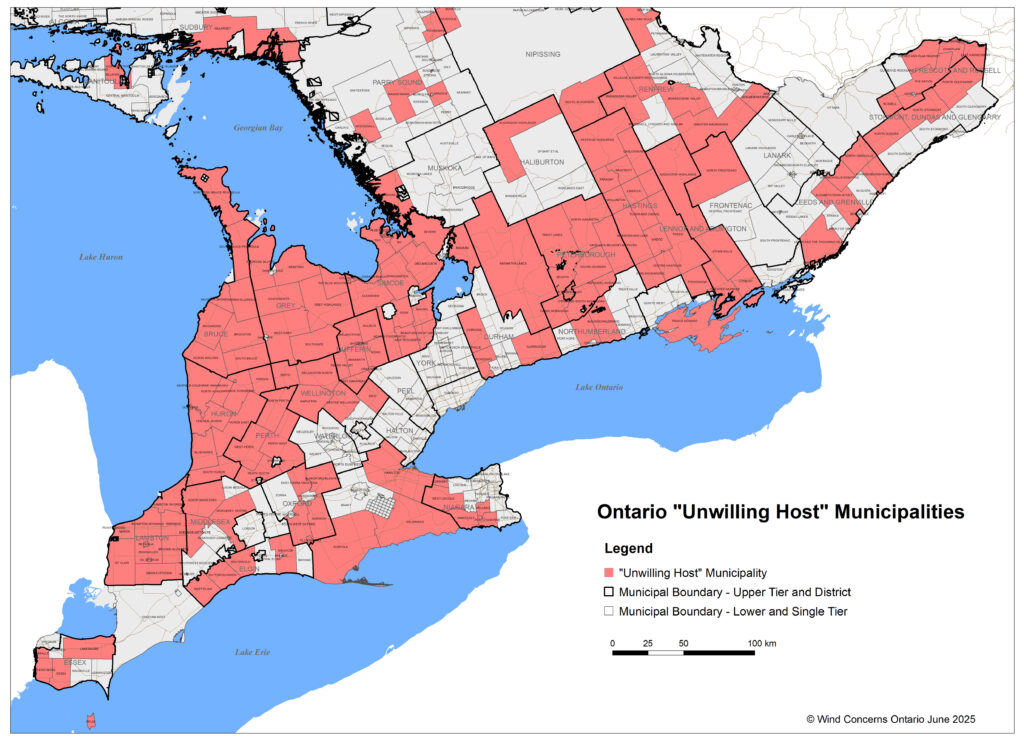This month, more Ontario municipalities passed resolutions declaring them to be “Unwilling Hosts” to new industrial wind power developments. This brings the total to 159, a significant proportion of the province’s rural communities.
Why? The majority of Unwilling Hosts already have operating wind turbines or are next to areas with wind power sites—they know what the problems are, and they don’t want more.
In 2025 however, there is an additional message to the Independent Electricity System Operator or IESO: the procurement process is a “mess”.
Throughout the months of “engagement” on the Long-Term 2-RFP, municipalities kept telling an apparently deaf (or uncooperative) IESO that the process was too complex, required too many municipal resources and at the end of the day, forced municipalities to make decisions about multi-million-dollar power projects on the barest of information.
Oxford County planner April Nix recently told the Woodstock-Ingersoll Echo that “the province has made a bit of a mess with all of this. They’ve not done a great job on actually explaining the mechanics of how [the impact assessment process] is supposed to work.”
In passing its Unwilling Host resolution, South West Oxford, home to some of the best farmland in Ontario, listed its concerns about wind power: “industrial wind turbine developments may negatively impact: Public health, with reports of sleep disturbances, noise-related stress, and other adverse effects; Property values, particularly in proximity to turbine installations; Agricultural operations, including interference with crop production, livestock behavior, aerial spraying, and productive land use due to setbacks and access roads; Water resources, where construction may pose risks to groundwater, aquifers, and private wells; Environmental ecosystems, through disruption of wildlife habitats and migratory paths.”
Their resolution then said:
“WHEREAS the current Independent Electricity System Operator (IESO) procurement process requires a Municipal Support Resolution before an application can proceed, yet provides municipalities with limited information about the full impacts of proposed energy projects at that stage;
AND WHEREAS municipalities are not resourced with the technical expertise or capacity to responsibly assess long-term impacts on agriculture, health, and the environment prior to issuing a Municipal Support Resolution;
AND WHEREAS while the current process mandates an Agricultural Impact Assessment, it is not required until after a contract is issued — leaving municipalities to make premature decisions without adequate information;
THEREFORE BE IT RESOLVED THAT the Township of South-West Oxford declares itself an “Unwilling Host” for industrial wind turbine projects under the current provincial procurement framework;
AND THAT the Township will not provide Municipal Support Resolutions for any such projects until the procurement process is revised to ensure:
● Full Agricultural, Health, and Environmental Impact Assessments are completed prior to municipal endorsement;
● Municipalities are provided with adequate data, timelines, and consultation resources to make informed decisions;
● Local autonomy and planning authority are meaningfully respected in energy project approvals”
That is very clear: the current IESO process is unworkable, and worse, disrespectful of community input. The current government in repealing the disastrous Green Energy Act promised to return municipal land use planning for energy projects but now seems to have devised a workaround to prevent a veto on proposed projects, no matter what public opinion is.
Will the IESO act before the next RFP? And can municipal councils stand up to the pressure? It will be critical for every Ontario citizen to make his or her wishes known, should an industrial-scale power project proposal come forward. Contact your Council members and respectfully request that they act in the public interest and deny official support without knowing all the impacts for the community.
It’s not 2009 anymore: the people of Ontario know what a failure the wind power experiment has been over the last 16 years — expensive, unreliable, invasive and a factor in the loss of good, productive farmland.
Jane Wilson
President
Wind Concerns Ontario
Ottawa

